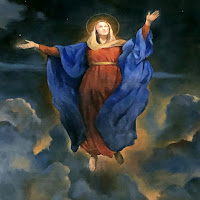Mary was obviously a significant figure in the life of Jesus, but the Gospels give us no information about her after Pentecost. A Byzantine author of the late 7th-early 8th century, Hippolytus of Thebes, wrote that she lived another 11 years after her son, dying in AD 41 [sic; I would have suspected AD 44, if Jesus lived 33 years]. Tradition had her supporting the early Church, living with the Apostle John, and being visited by the angel Gabriel who told her she would die in three days. The apostles, scattered around the world, were magically transported to her side (except for Thomas in India). Thomas arrived three days after her death, and asked to be taken to her grave in Gethsemane. When they got there, the body was gone but a sweet fragrance remained.
In the East was a tradition called the "Dormition of the Mother of God": the idea that she died peacefully in her sleep with no suffering. A sarcophagus in Zaragoza in Spain dated c.330 is carved with a scene of the Dormition. This idea of the Dormition was acceptable to the Western Church, although not initially celebrated as a holy day. The Eastern Roman Emperor Maurice (582 - 602) set the date of the celebration of the Dormition as 15 August, after which its celebration spread.
A bishop in Cyprus, Epiphanius of Salamis, living near the end of the 4th century, was concerned that he could find no authorized tradition about the end of her life, and he identified three beliefs surrounding the end of her life: that she died peacefully, that she died a martyr, that she did not die. Eventually he wrote a text claiming that, like Elijah, she did not die but was taken into Heaven.
The desire to have Mary continue to be special after bearing the savior teased theologians. Pope Leo IV (847 - 855) gave the Dormition (being called the Assumption in the West) a vigil and an octave to further its importance. Elisabeth of Schonau, a German nun, experienced visions of Mary and Christ in Heaven; as word spread, this promoted the belief that she was assumed into Heaven.
There is still no official dogma on whether Mary died and was then taken into Heaven, or was taken into Heaven without dying. To some this is a distinction without a difference, but it shows the uncertainty out of which this important Holy Day has sprung.
Some centuries after we've been discussing, Mary takes on an even grander role in Christian art, as the Seat of Wisdom. We'll explore that next.
